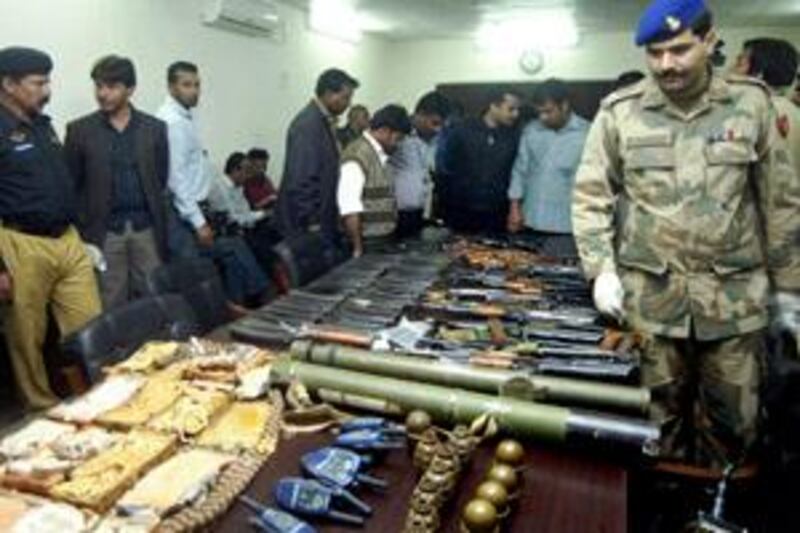ISLAMABAD // Pakistani security agencies investigating Tuesday's attack on the Sri Lankan cricket team today arrested four of the gunmen and are within reach of the others, sources said. Speaking on condition of anonymity, the security sources said the investigators had tracked the four terrorists to a student hostel at Firdous Market, about two kilometres from the scene of the attack in Lahore. "They found bloodstained clothes in a bathroom at the hostel. Its warden was interrogated and led the investigators straight to where the terrorists were hiding. There was no resistance," a source said. Investigators had earlier arrested an undisclosed number of people said to form the support network of the estimated 12 to 14 terrorists. "We've nabbed the network of people supporting the terrorists. It won't be long before we have them in custody," said a security source close to the official investigation. The suspects were not among 20 people arrested today and named as suspects by police in central Punjab province. Speaking on condition of anonymity, the security source said investigators had received witness reports of "a foreigner" being among the estimated 12 to 14 terrorists. Evidence later uncovered from near the scene of the attack, which killed seven and injured 19, led them straight to the support network. Sources said the findings had convinced investigators Tuesday's attack was carried out by local militants under the direction of a foreign handler. The government in Islamabad is awaiting the preliminary findings of the official investigation team, which includes operatives from two civil and as many military security agencies. Rehman Malik, the Pakistan interior ministry chief and a confidante of the president, Asif Zardari, had on Tuesday refused to speculate on the identity of the terrorists and their handlers. In the same vein, he would not rule out a "foreign hand" - the term Pakistan and India use to describe each other's alleged involvement in terrorist attacks. Having reviewed the bloody sequence of events, analysts have concluded the attack was a botched attempt by Brigade 313, an alliance of four Pakistani militant organisations, to take the team hostage. The militants' plan, the analysts surmise, was to exchange the cricketers for top Lashkar-i-Taiba militants about to go on trial in Pakistan for their role in the attacks in Mumbai in November. Analysts are in consensus that domestic militants, particularly those who have trained and fought alongside Taliban and al Qa'eda militants, are the only realistic candidates for a terrorist operation of the level of sophistication seen in Lahore. They draw parallels between Tuesday's attack and two previous terrorist operations conducted to secure the release of the leaders of Pakistani militant organisations. The first was the Dec 1999 hijacking of an Indian Airlines flight by Jaish-i-Mohammed to Taliban-ruled Afghanistan. It resulted in the release from Indian prisons of the Jaish founder, Maulana Masood Azhar, and a British Pakistani, Omar Saeed Sheikh, who was later arrested for the murder of Daniel Pearl, The Wall Street Journal reporter. The second was a March 2008 suicide bombing of the Navy War College in Lahore, carried out by Harkat-ul-Jihad-ul-Islami, a so-called group of "Punjabi Taliban". After the bombing, the Harkat leader, Qari Saifullah Akhtar, was released - despite having been named earlier by Benazir Bhutto, the assassinated former prime minister and wife of Mr Zardari, as being responsible for an Oct 2007 bombing of her cavalcade in Karachi. The organisations are members of Brigade 313, an umbrella group of Pakistani militant outfits that fought alongside the Taliban and al Qae'da in Afghanistan during the US military invasion in 2001. Both have since been weakened by government crackdowns and are considered to be dormant within Pakistan. But that is in sharp contrast to the two other groups associated with the Brigade: Lashkar-i-Taiba and Lashkar-i-Jhangvi, a sectarian outfit under the operational command of Mati-ur-Rehman, the head of the al Qa'eda military committee, which is responsible for co-ordination with Pakistani militants. Mr Rehman is a primary suspect in an Aug 2006 plot to bomb transatlantic passenger jets taking off from London. Independent analysts had on Tuesday concluded that either of the Lashkar groups were the probable perpetrators of the Lahore attack. They now believe the two organisations, which both follow the Ahl-i-Sunnat school of Sunni Islam, could have worked together to secure the release of Zaki-ur-Rehman Lakhvi and Zarar Shah, the Lashkar-i-Taiba leaders arrested for planning and co-ordinating the Mumbai attacks. "It is highly plausible that Taiba staged the attack with strategic and logistical support from Jhangvi," said Amir Mir, a Lahore-based author of books on militancy in Pakistan. He is among a growing body of opinion that has concluded that the perpetrators of the Lahore attacks were seeking to take hostage the Sri Lankan cricketers, and release them in exchange for the detained Lashkar-i-Taiba leaders. Analysts point to the tactics of the attackers and the contents of their abandoned backpacks - they were full of snacks and bottles of mineral water - as evidence that a lengthy standoff had been anticipated. Witnesses reported that the attackers were positioned on all sides of al Falah Square, a roundabout about 500 metres from the Qadafi cricket stadium. They had initially focused gunfire on police escort vehicles, looking to trap the cricketers' bus between the immobilised vehicles. The terrorists only fired at the bus after the bus driver found a way through. The official investigation team will submit its preliminary findings to Mr Zardari tomorrow afternoon. thussain@thenational.ae
Pakistan arrests 'terrorist network'
Pakistani security agencies investigating the attack on the Sri Lankan cricket team arrest four of the gunmen.

Editor's picks
More from the national




